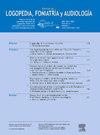注意控制和教育经验对双语儿童阅读能力的影响
Q3 Nursing
引用次数: 0
摘要
前言和目的有大量的研究集中在双语儿童的教育经历上,但需要进一步的研究来确定影响双语阅读的具体因素。在本研究中,我们考察了注意力控制(面对分心时保持目标的能力)和教育经历(练习阅读的时间)对双语儿童(英语-西班牙语)阅读能力的影响。样本包括来自美国一所浸入式学校的72名发展中的双语儿童。参与者对侧卫任务(衡量注意力控制)和词汇决策任务(衡量阅读能力)做出反应。结果注意控制对双语儿童阅读能力有显著的预测作用。此外,儿童在避免被英语假同音字分散注意力方面效率更高,在避免被西班牙语假同音字分散注意力方面效率也更高。结论双语儿童的注意力控制与阅读能力之间存在密切联系。此外,研究结果支持语言相互依赖假说,因为双语儿童的读写技能是跨两种语言传递的。本文章由计算机程序翻译,如有差异,请以英文原文为准。
The effects of attentional control and educational experience on reading ability in bilingual children
Introduction and objective
There is a substantial body of research focused on the educational experiences of bilingual children, but additional research is needed to determine the specific factors that influence bilingual reading. In this study, we examined the influence of attentional control (the ability to maintain a goal in the face of distraction) and educational experience (amount of time practice reading) on the reading abilities of bilingual children (English – Spanish).
Methodology
The sample included 72 developing bilingual children from an immersion school in the United States. Participants responded to a Flanker task (a measure of attentional control) and a Lexical Decision task (a measure of reading ability).
Results
Attentional control significantly predicted reading ability in bilingual children. In addition, children more efficient at avoiding distraction from English pseudohomophones were also more efficient at avoiding distraction from Spanish pseudohomophones.
Conclusions
These findings point to a close connection between attentional control and reading ability in bilingual children. Furthermore, the results support the linguistic interdependence hypothesis, as literacy skills are transferred across the two languages of bilingual children.
求助全文
通过发布文献求助,成功后即可免费获取论文全文。
去求助
来源期刊

Revista de Logopedia, Foniatria y Audiologia
Nursing-LPN and LVN
CiteScore
1.10
自引率
0.00%
发文量
28
 求助内容:
求助内容: 应助结果提醒方式:
应助结果提醒方式:


